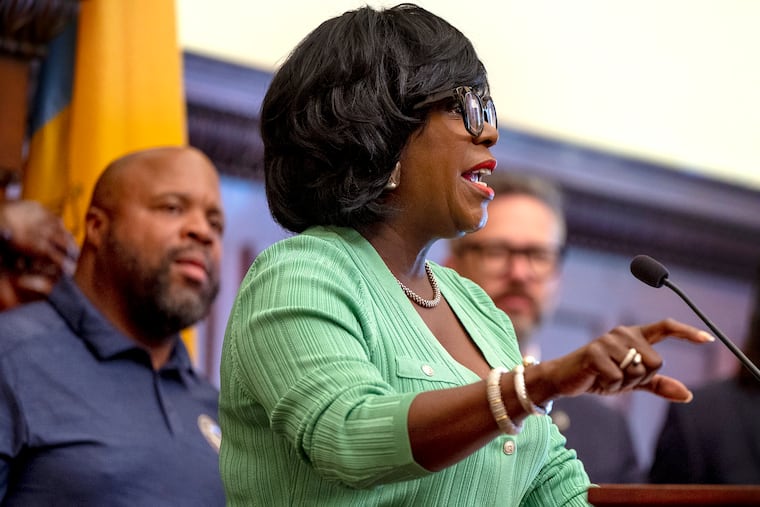Mayor Cherelle Parker defends her strict return-to-office policy for city workers a day before the dispute heads to court
Since the pandemic, no major U.S. city has adopted a policy requiring all employees to work in person five days a week. Parker is facing a lawsuit from a union representing city workers.

Mayor Cherelle L. Parker on Wednesday doubled down on her controversial decision to require all city workers to return to full-time in-person work, saying that the policy is needed to bolster Philadelphia’s downtown economy and that she viewed it as a matter of equity between employees who can perform their jobs from home and others, such as police officers and sanitation workers, who cannot.
“I made a decision that I stand by firmly, and that is — in order to make good on [my] promise to [voters] — that I needed Philadelphia’s municipal workforce to return to office to provide valuable supports and services to you, the taxpayers of the city of Philadelphia,” Parker said at a City Hall news conference. “I need us all right now to make a sacrifice for our city.”
» READ MORE: Union that represents Philly city workers sues over return-to-office mandate
Her comments came a day before a Philadelphia Court of Common Pleas judge is set to consider a lawsuit seeking to block the policy from taking effect next week. The suit was filed by the American Federation of State, County and Municipal Employees District Council 47, a union that represents the city’s white-collar workers — those most likely to be affected by the change.
Robert Harris, the union’s vice president, objected to Parker’s rhetoric regarding city workers who can and cannot work from home.
“She chose to use the word ‘equality’ to actually be very divisive to our members,” Woods told reporters after Parker’s news conference. “What I’m hearing from workers is that this is a very important benefit from them. … We’ve also heard a lot from them that they would seek employment elsewhere.”
Since the onset of the pandemic, each city department has determined which employees need to report for in-person work under a policy established by former Mayor Jim Kenney. Parker took office in January, and has signaled for months that she wants to end that policy.
Although many private and public sector employees have cut back on the availability of work-from-home arrangements over the last two years, no major U.S. city has adopted a policy as categorical as Parker’s, with all employees required to work in person five days a week. New York City Mayor Eric Adams attempted to enforce a similarly strict policy, but he abandoned it last year, allowing about 25% of city workers to telecommute two days a week.
» READ MORE: Other Northeast U.S. cities have brought municipal workers back to the office. Just not every day like Philly.
Parker on Wednesday illustrated what she views as the dangers of the work-from-home economy by pointing to Washington, which saw its city government raise taxes and lay off workers this year amid a budget crisis that has been blamed on the hollowing out of downtown office buildings.
She praised Washington Mayor Muriel Bowser as “a dynamic mayor who I’ve been watching” and said Bowser deserves a “huge hats off.” Bowser, however, only requires city workers to report to the office four days a week.
Parker noted Wednesday that about 80% of Philly’s municipal workforce already works in-person full time. That includes many of the city’s lowest-paid workers, including trash collectors, but it also includes the highest rung of city government, such as Parker’s aides, top city bureaucrats, and department heads.
AFSCME District Council 33, which represents the city’s blue-collar workers, is not a party to DC 47′s lawsuit and has a smaller share of its members who would be affected by the policy. But Greg Boulware, DC 33′s newly elected president, said Wednesday that his union supports their AFSCME counterpart’s efforts.
The dispute over the return-to-office policy comes as the two unions are in negotiations with Parker’s administration over new contracts that will determine the pay rates and benefits for a vast majority of the city workforce. Their members are working on the terms of contracts that expired on July 1 as talks continue.
Parker has asked the unions to agree to one-year contract extensions that largely maintain the terms of deals that were negotiated under Kenney. Boulware, who recently won his seat in a bitterly contested DC 33 election, campaigned in part on insisting on a traditional multiyear deal.
Parker won last year’s mayoral election with significant support from organized labor, and said Wednesday that these disputes will not shake her commitment to being a worker-friendly mayor.
“We want to grow our municipal workforce. We need to strengthen it,” she said. “It is an economic driver.”